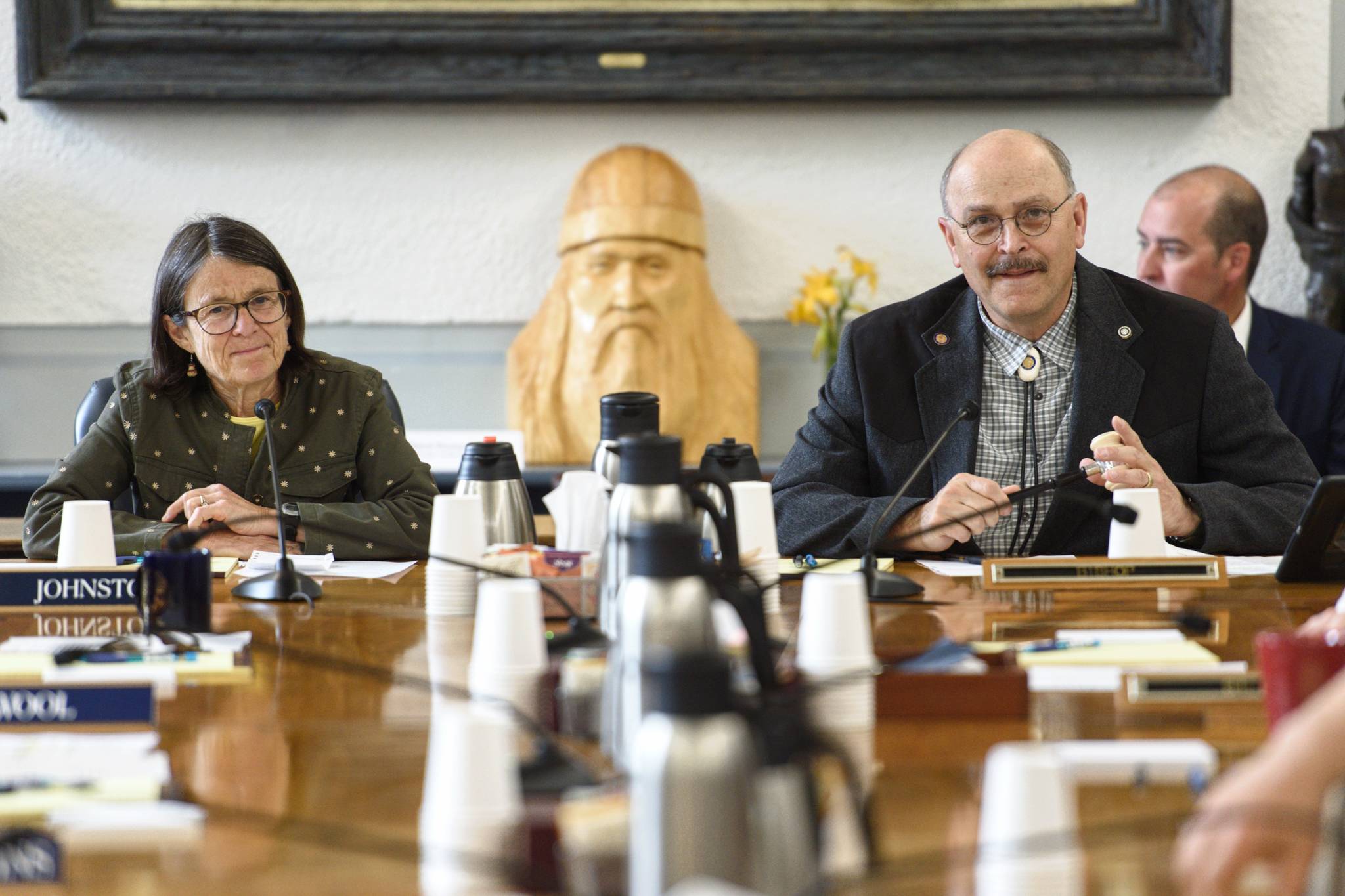Recent history repeated itself Wednesday.
In the House on Wednesday, Rep. Dave Talerico, R-Healy, proposed including a $3,000 PFD in this year’s capital budget. After hours of debate where nearly every present representative spoke, the proposal failed, 21-15. That vote came days after the Senate also failed to agree on a PFD amount.
On Wednesday morning, the Permanent Fund working group held its first gathering, with the eventual goal of finding an agreeable future for Permanent Fund earnings and the dividend.
There wasn’t much to see in the first meeting, but the co-chairs of the group outlined what they’ll be doing in the next few weeks. The working group, which includes four senators and four representatives, will come up with recommendations for the Alaska Legislature about everything relating to the Permanent Fund — how to allocate money within the fund long-term, how much the dividend will be worth this year and whether they need to change the formula for calculating the dividend.
[With no PFD attached, Legislature’s budget heads to governor’s desk]
The group — chaired by Sen. Click Bishop and Rep. Jennifer Johnston — will meet regularly and Bishop told reporters Wednesday that he hopes to have recommendations for the Legislature in 21 days (which would be July 2). Johnston, an Anchorage Republican, said everything is on the table, and both chairs said they’re looking to take a civil and open approach to the meetings.
“My hope, just like Sen. Bishop, is that we can have a conversation that is more about the need to develop some kind of policy without emotion,” Johnston told reporters Wednesday. “A lot of times, and this has been going on for quite some time, this has been an emotional debate. Sometimes emotional debates are good, but sometimes they end up with parties yelling at each other.”
The debate over the dividend has dominated this year’s session and special session. Lawmakers are deeply divided on the issue, as shown by recent votes in both houses. In the Senate, both the Minority and Majority caucuses are split on the amount of the dividend, with some proposing as high as $3,000 and some proposing as low as $900 per person.
Gov. Mike Dunleavy also plays a role in this, as he’s stated that he would veto anything but a full $3,000 dividend. He reiterated that Wednesday, tweeting “the Legislature’s job is not over until it passes a full statutory PFD for Alaskans.”
I said it before and I’ll say it again, the Legislature’s job is not over until it passes a full statutory PFD for Alaskans. (3/3) #akleg #akgov— Governor Mike Dunleavy (@GovDunleavy) June 12, 2019
Bishop, a Fairbanks Republican, said during Wednesday’s meeting that the chairs will reach out to Dunleavy’s administration to involve them in the working group’s work.
Where the members stand
The members of the working group stand on all sides of the dividend issue. The senators are: Sens. Shelley Hughes, R-Palmer ;Donny Olson, D-Golovin; and Bert Stedman, R-Sitka. The representatives are: Reps. Jonathan Kreiss-Tomkins, D-Sitka; Kelly Merrick, R-Eagle River; and Adam Wool, D-Fairbanks.
In last week’s votes in the Senate, Stedman voted against a $3,000 dividend while Hughes and Olson voted in favor. Neither Bishop, Hughes nor Olson sponsor or co-sponsor any PFD legislation this session.
Stedman has been outspoken about wanting to move a large sum of money from the Permanent Fund’s Earnings Reserve to a constitutionally protected section of the Permanent Fund in an attempt to preserve it for future generations. He also proposed and spoke in favor of a bill in the Senate to supply a $1,600 dividend.
Of the four representatives, all but Merrick voted against Wednesday’s amendment for a $3,000 dividend. In a statement to the Empire, Merrick said she brings a different perspective to the group, seeing as she’s the only first-year legislator to be in the room.
“Currently, I support a full statutory PFD this year, and believe any changes going forward should be put to a vote of the Alaskan people,” Merrick said. “I want to protect our resource wealth for my kids and future generations of Alaskans.”
[Municipal leaders bracing for governor’s vetoes]
Johnston is the primary sponsor of House Bill 139, would allow the Alaska Permanent Fund Corporation (APFC) to easier contract with subject matter experts to advise them on an investment. She is also a co-sponsor of House Joint Resolution 18, which seeks to set in stone the amount that the Legislature can take out of the Permanent Fund for government services.
Wool said in an interview Tuesday that he and Kreiss-Tomkins are more or less aligned on their visions of the Permanent Fund. Wool has been a staunch supporter of a smaller dividend, and said he firmly believes the dividend formula needs to be changed moving forward. Wool is the primary sponsor of House Bill 132, which bases the PFD calculation on oil revenues instead of the overall value of the earnings reserve in an attempt to save the state from paying money that it doesn’t have.
“I’m glad we’re doing this,” Wool said. “I’m glad people realize we can’t just pick a number (for the PFD), which we’ve done in the past, where we pick a number and then fund it with savings.”
Among other bills, Kreiss-Tompkins is the primary sponsor of HB 31, which proposes moving $5.5 billion from the Earnings Reserve to the constitutionally protected part of the Permanent Fund. Kreiss-Tomkins said in a statement to the Empire on Tuesday that he’s “open to a compromise, as I think we all need to be.”
• Contact reporter Alex McCarthy at amccarthy@juneauempire.com. Follow him on Twitter at @akmccarthy.

